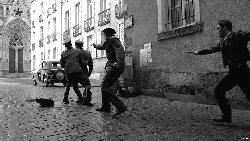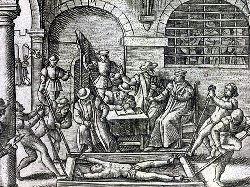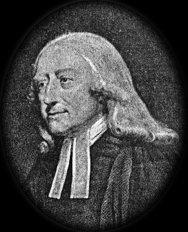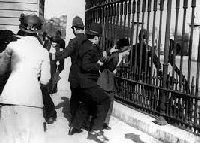 |
|
 |
We meet every six weeks or so, usually on a Wednesday evening, at one of our members' houses.
At our meetings one of our number gives a talk on a historical subject of particular interest to him/her for about forty minutes, then we have a discussion about what we have heard.
We currently have fourteen members but new recruits are always welcome. It is not compulsory to give talks so don’t be put off coming by thinking that you will have to perform.
At each meeting we decide on a speaker, subject and venue for the following meeting.
The choice of topic is often not known until the meeting actually takes place, as a group member will volunteer and then decide what the subject matter will be.
Would anyone who would like to do a one off presentation to the group on any historical event or person contact Pam Curley and a suitable date could be agreed.
Previous meetings:
January Historical Moral Dilemmas
March John Wesley and Methodism
April Open Topics
May The Clans of the Western Highlands and Islands of Scotland
June Richard III.
July What Else Happened in 1914.
August King Canute
Report on January Meeting
Historical Moral Dilemmas - prepared by Mike Humphris and discussed by the whole group
This was a group discussion based on information provided by Mike Humphris, who was unable to
 attend due
to ill health. Three examples were presented:
(1) Was
the killing of a German Commandant in Nantes in 1941 murder
or a legitimate act of war?
attend due
to ill health. Three examples were presented:
(1) Was
the killing of a German Commandant in Nantes in 1941 murder
or a legitimate act of war? 
(2) Was the destruction of Dresden in February 1945 a legitimate attack on a key railway and communications
 centre
or a crude act of revenge?
centre
or a crude act of revenge?(3) Was the torture of Guy Fawkes sadistic retribution or a reasonable and legitimate reaction?
These issues provoked a great deal of philosophical discussion, but as is so often the case, it was almost impossible to come up with a definite answer.
Pam Curley
Report on March meeting
 Presentation given by Michael
Sparrow on 18th March on John Wesley.
Presentation given by Michael
Sparrow on 18th March on John Wesley. The talk on John Wesley was very interesting, especially the information on the more private side of his life.
It also covered the motivating force which led him to split from the Anglican Church and the origins of Methodism.
Report on the April Meeting
Each member of the group was asked to select any year of their choosing, prior to 1938, and prepare a five minute talk on important or interesting events of that year. The following years were chosen:-
1876, 1894, 1930, 1789, 1914, 1916, 1865, 1905, 1888 and 1934. Some of the important events were Victoria becoming Empress, Instanbul becoming Constantinople, first telephone line from England to Australia, opening of the Manchester Ship Canal, William Booth founded the Salvation Army, invention of Neooprene and the first US glider flight.
Report on the May Meeting
Derek Jones gave a very interesting power point presentation on The Highlands and Islands of Western Scotland. The presentation defined very clearly the area to which was being referred and started as far back as the 7th century BC when the British Isles was overrun by Celtic tribes. It covered the time of the occupation of Britain by the Romans and the building of Hadrian's Wall to keep out the marauding Scots and then how the Scottish families or clans, became indigenous to particular areas of the western Highland and Islands.
Report on the June Meeting
'For this meeting we watched a recent TV programme on Richard III. Historically, he has always been portrayed as a very unpleasant character and was believed to have been responsible for the murder of the two princes in the tower. However, as more research has been undertaken, many doubts have arisen as to whether he really was as bad as the Shakespeare play would have us believe. This programme put forth a number of other possibilities as to who may have been responsible for the murder of the princes, given the politics of the time, and it came up with some very believable alternatives: it certainly led to a good discussion following the programme.'
Report on the July Meeting
Due to the high level of coverage on the centenary of WW1 last year, Terry thought it would be
 interesting to look at other events of that year. The Suffragette
movement was very active in the early part of 1914, at which time it
became very militant: eight churches and the Home
Secretary's house damaged with explosives,
paintings slashed and protesters fighting with the police. Also,
prior to the assassination of Franz Ferdinand, relations with Germany
appeared very cordial, trade was good and the German Ambassador had
been given an honorary degree at Oxford University. The much more
troubling situation for the British Government at the time was the independence
movement in Ireland.
However, at the outbreak of war the Suffragettes called a truce and of
course everyone's attention was focussed on the events in Europe.
Also, in 1914,
the Empress of Ireland sank in the St Lawrence with a loss of over
1,000 lives; Shackleton
set off to the Antarctic for the second time;
life expectancy for men was 49 and for women 53 and out of every 9 men
due for conscription to the army, only 3 were deemed fit. Had
Princip not assassinated Franz Ferdinand it is difficult to imagine how
very different everything would have been.
interesting to look at other events of that year. The Suffragette
movement was very active in the early part of 1914, at which time it
became very militant: eight churches and the Home
Secretary's house damaged with explosives,
paintings slashed and protesters fighting with the police. Also,
prior to the assassination of Franz Ferdinand, relations with Germany
appeared very cordial, trade was good and the German Ambassador had
been given an honorary degree at Oxford University. The much more
troubling situation for the British Government at the time was the independence
movement in Ireland.
However, at the outbreak of war the Suffragettes called a truce and of
course everyone's attention was focussed on the events in Europe.
Also, in 1914,
the Empress of Ireland sank in the St Lawrence with a loss of over
1,000 lives; Shackleton
set off to the Antarctic for the second time;
life expectancy for men was 49 and for women 53 and out of every 9 men
due for conscription to the army, only 3 were deemed fit. Had
Princip not assassinated Franz Ferdinand it is difficult to imagine how
very different everything would have been.